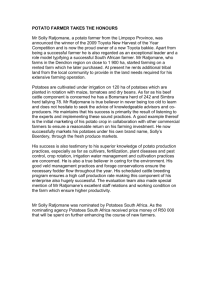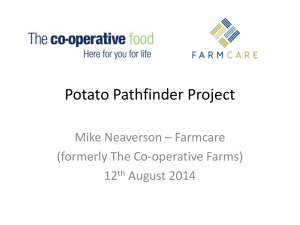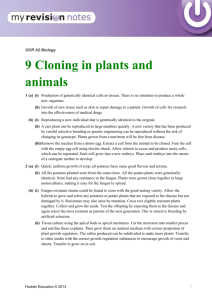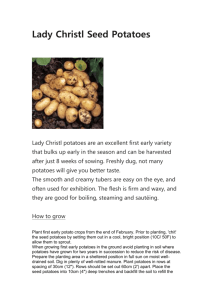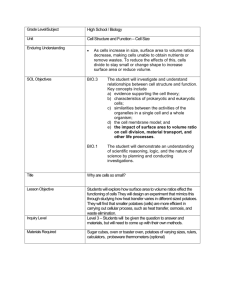Interest Groups - MrFurgione.com
advertisement
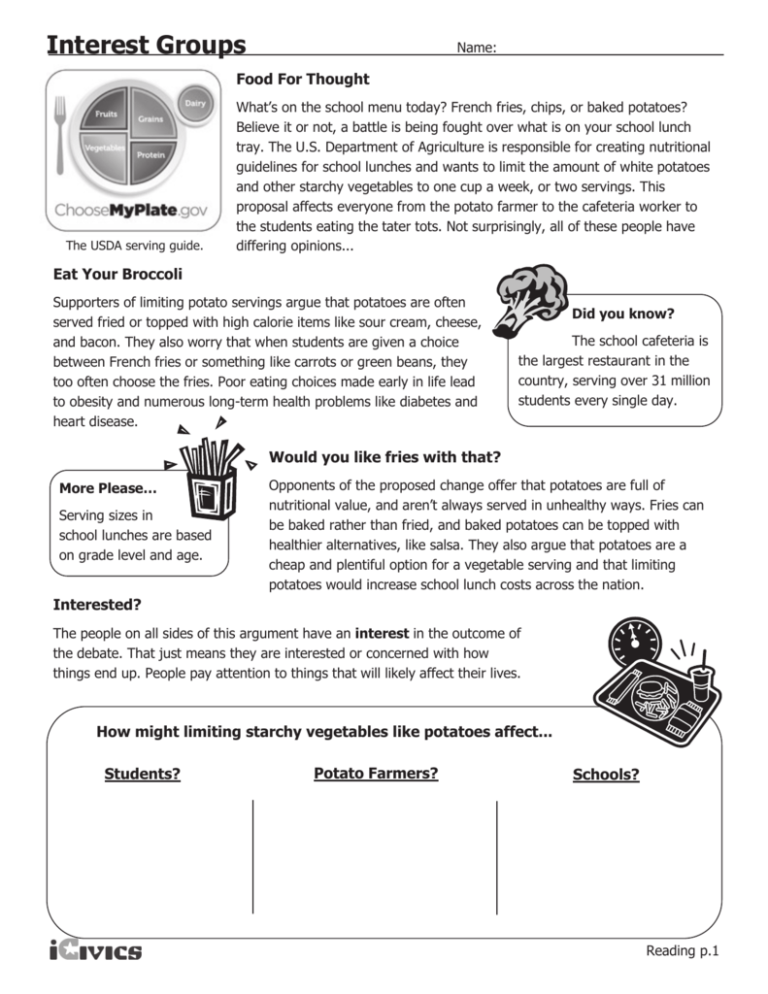
Interest Groups Name: Food For Thought The USDA serving guide. What’s on the school menu today? French fries, chips, or baked potatoes? Believe it or not, a battle is being fought over what is on your school lunch tray. The U.S. Department of Agriculture is responsible for creating nutritional guidelines for school lunches and wants to limit the amount of white potatoes and other starchy vegetables to one cup a week, or two servings. This proposal affects everyone from the potato farmer to the cafeteria worker to the students eating the tater tots. Not surprisingly, all of these people have differing opinions... Eat Your Broccoli Supporters of limiting potato servings argue that potatoes are often served fried or topped with high calorie items like sour cream, cheese, and bacon. They also worry that when students are given a choice between French fries or something like carrots or green beans, they too often choose the fries. Poor eating choices made early in life lead to obesity and numerous long-term health problems like diabetes and heart disease. Did you know? The school cafeteria is the largest restaurant in the country, serving over 31 million students every single day. Would you like fries with that? More Please… Serving sizes in school lunches are based on grade level and age. Opponents of the proposed change offer that potatoes are full of nutritional value, and aren’t always served in unhealthy ways. Fries can be baked rather than fried, and baked potatoes can be topped with healthier alternatives, like salsa. They also argue that potatoes are a cheap and plentiful option for a vegetable serving and that limiting potatoes would increase school lunch costs across the nation. Interested? The people on all sides of this argument have an interest in the outcome of the debate. That just means they are interested or concerned with how things end up. People pay attention to things that will likely affect their lives. How might limiting starchy vegetables like potatoes affect... Students? Potato Farmers? Schools? Reading p.1 Interest Groups Name: How does individual interest in a debate lead to action? What if people with these interests have other interests (like working or going to school) and can’t spend their entire day learning what is happening and doing something about it? Potato farmers and nutritionists have little time for marching in front of the USDA or making speeches to the public! Grouping Interests One way people can have their voice heard is to find others with the same concerns. Interest groups gather people and resources to support public policies that help their members. They work to persuade policy makers like senators and representatives to support government actions that help their members and oppose actions that hurt them. They also work to influence public opinion by educating the general public about their point of view. In this way, interest groups advocate, or promote, the needs and wants of the group. There are hundreds of interest groups in the United States working on many different types of issues. Terms to Know Public Policy: the stand the government takes about a problem or an idea for improvement Public Opinion: the collection of opinions or attitudes of a population Types of Interest Groups Most groups can be divided into five different categories. PUBLIC INTEREST ECONOMIC INTERESTS Focuses on topics that affect the general public like education, the environment, and politics Promotes the economic interests of their members in business, labor, and trade organizations PROFESSIONAL GROUPS Advocates for people in a particular profession, such as doctors, lawyers, and teachers IDEOLOGICAL GROUPS SINGLE-ISSUE GROUPS Promotes policies based on a set of core political or religious beliefs Focuses on one narrow topic, such as immigration or drunk driving Taking Sides In the school lunch potato battle, one group that supports the limits on starchy veggies is the Center for Science in the Public Interest (CSPI). The CSPI is a strong advocate for nutrition and food safety from a scientific perspective. On the other side of the discussion is the National Potato Council (NPC), which advocates for government policies that help U.S. potato growers prosper. Both groups work to inform the USDA and elected officials that their position on the issue is the correct one. Think of two goals each group might have that would either support or oppose the new USDA limits on potatoes in school lunches. 1. Support 1. Support Vs. Or Or Oppose 2. 2. Oppose Reading p.2 Interest Groups Name: Influencing Government Interest groups use several strategies to influence government. The amount of influence that interest groups have on government is a major issue of concern for many people today. At the same time, millions of citizens rely on interest groups to make their voices heard. Lobbying for Support Interest groups hire lobbyists to meet with members of the government and discuss the group’s issues and concerns. Lobbyists say that their job is to provide information to decision makers. The information lobbyists provide has been carefully chosen to persuade the audience to take one side of an issue. Lawmakers have to be aware of the bias in the lobbyists’ messages and consider both sides before they make any decision. Bias: favoring one view over another. Endorsing Candidates "K Street" is commonly used to describe lobbyists in Washington, DC. Many of the major lobbying groups have offices on this street. During elections, some interest groups may endorse, or officially support, candidates. Groups choose a candidate to support based on what the candidate has done in the past and where the candidate stands on issues important to the group. Once the candidate is in office, he or she may introduce new bills, support existing laws, or use influence on important committees. In return, the interest group encourages its members to vote for that person in the next election. In addition, the interest group may donate money to the candidate’s election campaign. Raising Money Interest groups raise money to support their efforts to influence the government. This creates the concern that interests groups can “buy” candidates by contributing lots of money to the candidate’s election campaign. Once in office, such a candidate might be more concerned about pleasing the interest group than representing the voters. Because of this, there are strict rules about how interest groups may collect and donate money to political campaigns. Those that do must form a political action committee (PAC) that follows strict government rules about giving money to political candidates. Not everyone agrees about what kinds of rules interest groups should have to follow. Some people fear that campaign financing laws limit the ability of people to support the causes they care about. Others fear that interest groups have grown to have more influence on government than the public at large. They believe the groups should be controlled. The debate continues as some interest groups and wealthy individuals who support them find loopholes, or ways around, the campaign finance laws. Strategies for Influencing Government: Inform the public and elected officials about issues that matter to the group. Donate money to political campaigns in exchange for support by the candidate. Endorse a candidate running for office and suggest that the group’s members vote for him or her. Reading p.3
